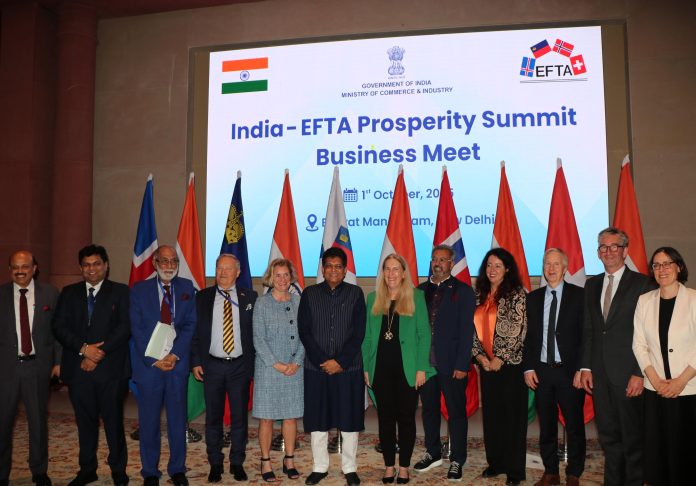India–EFTA Trade Pact Takes Effect, $100 Billion Investment Expected
New Delhi, Oct. 1, 2025 —India and the European Free Trade Association (EFTA) formally launched their trade partnership this Wednesday under the Trade and Economic Partnership Agreement (TEPA), with EFTA pledging $100 billion in investment over 15 years, the EFTA Secretariat reported.
Signed in March 2024 after 16 years of negotiations and 21 rounds of talks, the agreement covers goods, services, investment, intellectual property, government procurement, competition, and sustainable development (EFTA Secretariat, 2024). Together, India and the EFTA countries — Switzerland, Norway, Iceland, and Liechtenstein — represent a combined GDP of about $5.4 trillion.
At the Prosperity Summit in New Delhi, Commerce Minister Piyush Goyal said the pact aims to strengthen “resilient and reliable global supply chains” (Ministry of Commerce & Industry, India, 2024).
The deal reduces tariffs on 82.7% of India’s tariff lines, covering 95.3% of EFTA exports, while excluding sensitive sectors like dairy, soy, and coal. Swiss luxury goods and diamonds will see phased duty reductions, Reuters reported.
FTA’s investment is expected to generate approximately one million jobs in India over the next 15 years, according to the Ministry of Commerce. Analysts caution that the pace of investment and careful monitoring of domestic industries will determine the deal’s overall success. “The $100 billion commitment is ambitious,” economist Biswajit Dhar told Indian Express (2024).
The agreement also includes provisions on intellectual property, government procurement, competition, and sustainable development, reflecting modern trade standards (EFTA, 2024). It aligns with India’s strategy to diversify trade beyond the U.S. and China, while EFTA members gain opportunities in pharmaceuticals, machinery, and financial services, and indirect access to broader European markets.
The entry into force of TEPA marks a milestone in India’s global trade strategy and sets the stage for deeper economic engagement with Europe, potentially shaping future agreements with other international partners.







